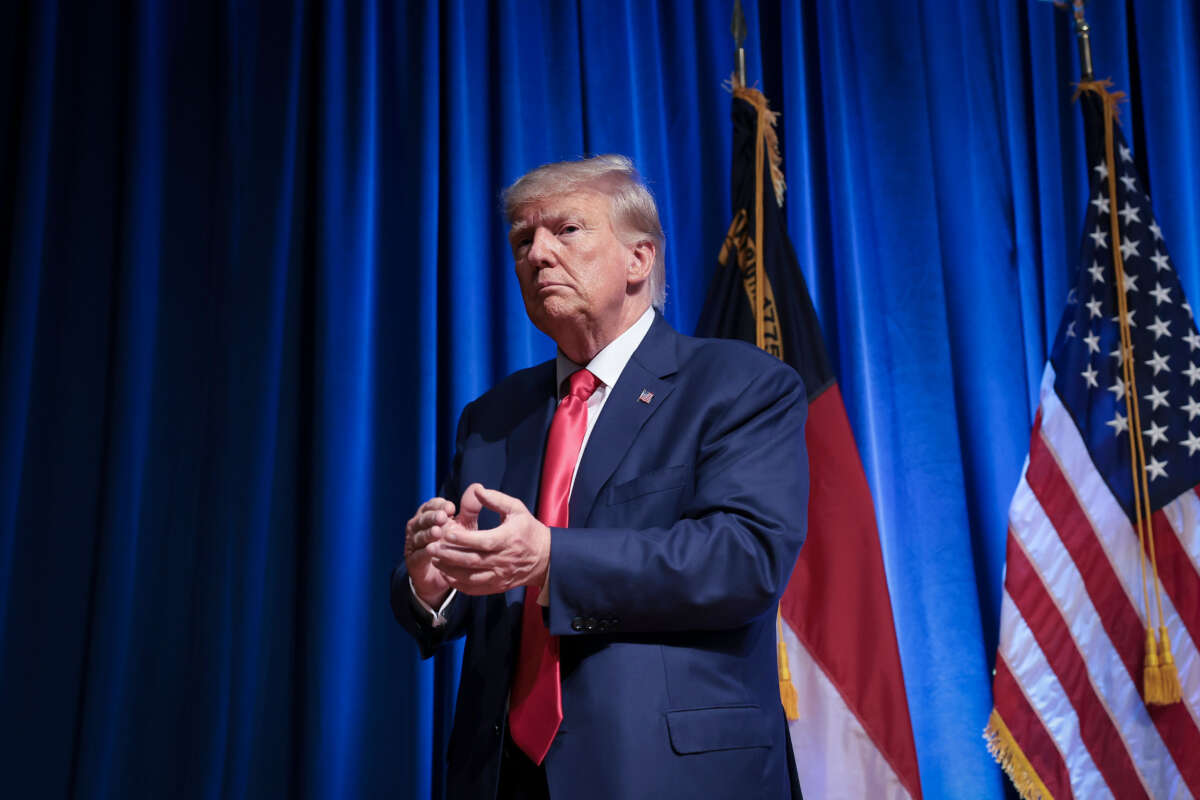A federal judge has set the trial date regarding the 37 charges former President Donald Trump faces for improperly retaining thousands of government documents, including hundreds of classified materials, at his Palm Beach, Florida, estate.
Pending any further delays, the trial will commence on May 20, 2024, according to an order from District Judge Aileen Cannon. It is planned to last for around two weeks.
Cannon, who was appointed by Trump, heard arguments from Department of Justice (DOJ) special counsel Jack Smith, who asked for a trial date in December of this year, as well as from Trump’s lawyers earlier this month, who wanted the trial to be delayed indefinitely until after the 2024 presidential election, in which Trump is a candidate.
In response to Trump’s request, Smith filed a brief last week calling the idea “backward,” noting that there is “no basis in law or fact for proceeding in such an indeterminate and open-ended fashion.” Smith also rejected Trump’s claim that a trial date before the election would be unfair to him, as the former president argued that an unbiased jury couldn’t be assembled before November 2024.
“There is no reason to credit the claim,” the DOJ response said. “Our jury system relies on the Court’s authority to craft a thorough and effective jury selection process, and on prospective jurors’ ability and willingness to decide cases based on the evidence presented to them, guided by legal instructions from the Court.”
Within her order, Cannon appeared to agree with Smith, though she did not agree to his timeline for the case, setting a trial date for nearly half a year after what he had requested.
Cannon’s order also cited “voluminous” evidence presented by DOJ prosecutors explaining why an indefinite court date was improper, and stated that there wasn’t “a sufficient basis on this record to postpone” a trial.
But the federal judge, who has ruled favorably for Trump in this case in the past, also described Smith’s request as “atypically accelerated” and “inconsistent,” in her view, with “ensuring a fair trial.”
Legal experts on social media had mixed reactions. Some said the delay will inevitably lead to more delays in the future, pushing the matter beyond the 2024 race, while others said that the May trial date would still be proper.
“In a case like this, [there is] plenty of opportunity for Trump to manufacture delay & if this date slips, it makes it far less likely [a] trial happens before the election,” said former federal prosecutor and current University of Alabama law professor Joyce Vance.
“Judge Cannon set Trump’s federal trial for his documents/obstruction/espionage case for May 2024. She should have set it earlier,” said Glenn Kirschner, a former federal prosecutor who is also a legal analyst for NBC News. “BUT it will be over months before the Nov. 2024 election. So people will know if they’re voting for a convicted felon or a completely exonerated man.”
Cannon’s decision raises the possibility of either side filing an appeal to a higher court — Trump could raise constitutional questions, for example, over claims that the timeline is too quick, and thus unfair for his legal team to mount a defense, while Smith could argue against Cannon’s findings that his schedule is too aggressive.
If the trial isn’t delayed further, it will take place in the middle of the Republican Party’s primary nomination contests. Trump has complained about a trial taking place between now and November last year — however, by the time the trial commences, most of the primaries will already have happened, and Trump may already have enough wins to secure the nomination. (When he ran in 2016, Trump won the nomination by the end of May that year.)
The trial involves a slew of charges against Trump, including allegations that he violated the Espionage Act by improperly retaining thousands of government documents after leaving the White House.
After Trump’s departure from office, the National Archives and Records Administration (NARA) sought to get Trump to return the records in his possession for nearly a year. Over the course of 2021, Trump and his lawyer dismissed those attempts, only relenting when the agency threatened congressional involvement in the matter.
In January 2022, Trump allowed NARA officials to retrieve some documents from his Mar-a-Lago estate in Florida. After doing so, NARA saw that some of the materials they retrieved were marked classified, and requested that the DOJ get involved in pursuing the remainder of the classified documents. The DOJ issued a subpoena in May, which was carried out in June, with Trump again seemingly voluntarily cooperating with federal agents to return the documents.
Evidence later surfaced indicating that Trump had actually had an aide remove documents from a storage area at Mar-a-Lago prior to one of his lawyers combing through the documents that had remained in that room. Unaware that dozens of boxes had been moved, that lawyer informed the DOJ that all classified materials had been returned.
Because Trump had violated the terms of the subpoena and kept documents that were meant to be returned, the FBI obtained and carried out a search warrant in August, retrieving over 100 additional classified documents in addition to the close to 200 documents federal officials had already taken back.
If convicted, Trump could face a long prison sentence. However, he could still run for president, as the U.S. Constitution does not prohibit incarcerated people from pursuing that office.
We have 7 days to raise $45,000 — we’re counting on your support!
For those who care about justice, liberation and even the very survival of our species, we must remember our power to take action.
We won’t pretend it’s the only thing you can or should do, but one small step is to pitch in to support Truthout — as one of the last remaining truly independent, nonprofit, reader-funded news platforms, your gift will help keep the facts flowing freely.
